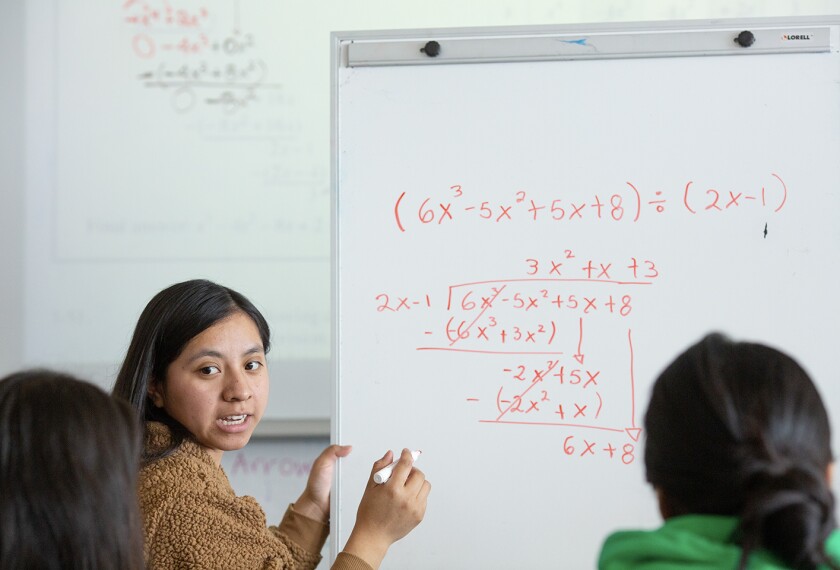Many students land in summer school this time of year, sometimes in part due to chronic absenteeism during the school year. But when absenteeism continues during summer school, these students—many of whom desperately need to catch up on remedial skills or gain additional practice to advance to the next grade—can get stuck in a cycle of failure.
And that’s a problem, because summer school programs often struggle with regular attendance. The Tennessee Education Research Alliance (TERA), a research-practice partnership between Vanderbilt University and the Tennessee Department of Education, analyzed attendance rates in a 2022 voluntary summer school program for low-performing students in 10 districts statewide.
It found that only 1 in 8 students attended 90 percent or more of the days offered.
The Volunteer State, like many states, has been looking to summer school to help close the gap on pandemic-era learning loss. And some studies show that such programs can help improve learning, but only if students show up.
A 2016 report on the Wallace Foundation’s National Summer Learning Project, aimed at low-income and low-achieving elementary school students in five urban school districts, found that students who attended at least 20 days of a five- to six-week summer program saw gains in reading and math scores that lasted until the end of the following school year.
The pressure on summer schools will soon grow in Tennessee because a new law, beginning with the 2023-24 school year, requires schools to retain 3rd grade students who fail to demonstrate proficiency in English/language arts standards by scoring at the 50th percentile or higher on the state’s benchmark assessment. Summer school programs provide students with a second chance to improve their ELA proficiency and retake the test before the next school year.
Barriers to attendance: social stigma, family schedules
The Tennessee study found—based on teacher responses—that the most common barriers to enrollment in these summer programs were family schedules, parent work schedules, and social stigma regarding remediation. In terms of attendance, economically disadvantaged students attended fewer days on average.
“The gap between enrollment and attendance for economically disadvantaged students will be important to monitor as summer learning attendance becomes mandatory for many rising 4th grade students,” the study said.
Several respondents expressed disappointment with attendance rates as well, according to the report.
“Student attendance was not as high as I hoped it would be, especially with students that were struggling,” one teacher wrote.
Another staff member said many students would attend sporadically or habitually arrive late, with many parents treating the program like free child care instead of an educational opportunity.
Fifty-five percent of middle school staff described a lack of parental desire or interest as a barrier to enrolling students in these programs; 46 percent of the same staff said stigma around remedial learning was also a barrier, while only 29 percent of elementary staff said the same for their students.
Partnering with parents to improve summer school attendance
Shawn Walker, student success coordinator at participating district Lenoir City Schools in Lenoir City, Tenn., said the study’s results helped the district gain a sense of what it can do to improve attendance in the future.
“The biggest change [we plan to implement] is communicating with parents through social media and utilizing morning and afternoon parent meetings to try to really help get the message out there for our families,” he said.
Despite only starting the summer program this past week, Walker said he is optimistic about this year’s program and continuing to see students accelerate.
Partnering with parents is key to boosting attendance for any summer school program, said Christina Claiborne, director of the Research to Practice Network with EdResearch, which was not part of the Tennessee study. She said programs should frame summer school not as a continuation of school, but rather an intentionally designed program.
“You’re highlighting past student experiences and really encouraging them to get excited about the program while setting expectations for attendance,” Claiborne explained. "[This] allows students, parents, and teachers to get on the same page and understand that this is a thoughtfully designed and implemented program and has a real potential for impact.”
Next steps to boost summer school attendance
James Guthrie, senior research associate at TERA and principal investigator on the Tennessee study, plans to continue his research in the same districts once the summer programs end this year. He said he is intrigued to see how the summer learning camps’ experiences change due to the recently enacted 3rd grade reading retention law.
“A lot more rising 4th graders especially are enrolled in the camp because their grade advancement depends on it,” Guthrie said. “The stakes on academic effects from the camps are so much higher, and how that might affect both the student and staff experiences is something we’ll be looking for in this upcoming evaluation.”










